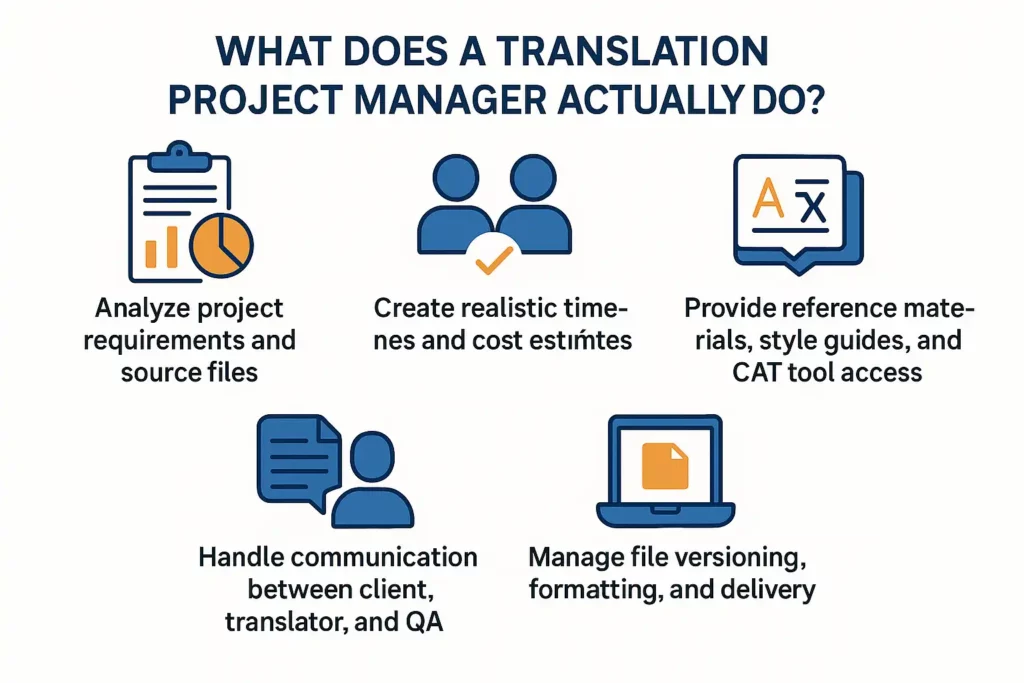Translation Project Managers (TPMs) are the backbone of successful multilingual projects. A skilled Translation Project Manager ensures smooth workflows, aligning translators, reviewers, and clients at every stage. Discover how they assign tasks, manage timelines, coordinate teams, and ensure quality—from quote to final delivery. Ideal for clients, translators, and localization teams.
🔍 What Does a Translation Project Manager Actually Do?
The Translation Project Manager (TPM) is the central coordinator of multilingual projects. While translators focus on converting text, TPMs are responsible for the entire translation process—from quote to delivery.
Key Responsibilities:

As a general rule, the larger or more specialized the project, the more critical the role of the TPM becomes.
🛠️ What Tools Do TPMs Use?
A Translation Project Manager relies heavily on technology to streamline workflows, prevent errors, and track progress.
Common Tools:
| Tool Type | Examples |
|---|---|
| CAT Tools | SDL Trados, MemoQ, Smartcat, Phrase |
| TMS (Translation Mgmt) | XTRF, Plunet, Lokalise |
| QA Tools | Xbench, Verifika |
| File/Time Mgmt | Trello, Asana, MS Excel, Google Sheets |
| Communication | Slack, Teams, Email, WeChat |
Most modern TPMs also work with APIs and CMS connectors to automate handoffs and version control—especially in software localization and e-commerce workflows.
👥 How Do TPMs Coordinate People?
Human coordination is one of the most important—and nuanced—parts of the job. TPMs need to:

Understand translator strengths and specialties
Be culturally aware (e.g., date formats, idioms, tone preferences)
Manage time zones and weekend schedules
Handle last-minute changes or scope creep gracefully
Provide feedback and support post-delivery
“It’s not just about assigning work—it’s about building a team that trusts you and delivers.”
— Zhao Wei, TPM at a global LSP
On average, a single TPM may manage 5–15 translators or linguists across multiple time zones, juggling multiple deliverables simultaneously.
📊 How Do TPMs Ensure Quality?
Quality control is not optional—it’s baked into the TPM’s responsibilities. A strong PM implements checkpoints throughout the project lifecycle.
TPM Quality Workflow:
- Pre-flight review of source material
- Assign translators with domain expertise
- Provide glossaries, termbases, and style guides
- Include QA pass using tools like Xbench or a second linguist (reviewer)
- Post-delivery formatting and final check
As a whole, TPMs are the ones accountable for final delivery quality, even if they didn’t translate a single word themselves.
💰 What Value Do TPMs Add for Clients?
For clients, TPMs are the single point of contact and the guardian of consistency, deadlines, and budget.
They Add Value By:
- Saving time: No need to chase multiple freelancers
- Minimizing risk: Reduce the chance of errors or late delivery
- Maximizing quality: TPMs ensure adherence to standards
- Scaling effortlessly: TPMs can manage multiple languages in parallel
- Providing peace of mind: You always know who to contact
💼 Need your next translation handled with clarity and care?
👉 Talk to Az-Loc now and experience stress-free, scalable translation that speaks your brand’s voice in every language.
Chinese Website Translation: A Complete Guide for Global Businesses
Chinese Translation Tips: 5 Proven Ways to Manage Successful Projects
